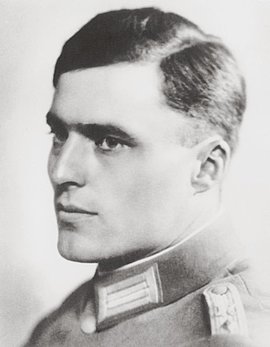Claus Schenk Graf von Stauffenberg
Raised a Catholic, Claus Schenk Graf von Stauffenberg displayed a sense of responsibility based on social and ethical principles from an early age. He and his brother Berthold, who was also part of the inner circle of conspirators, discussed fundamental political principles. The poet Stefan George was very influential in the Stauffenberg brothers’ intellectual and moral development.
It was only during the war that Stauffenberg recognized the criminal nature of National Socialist policy. Gradually and more slowly than his fellow conspirators, he extricated himself from the fascination that Hitler’s military successes in particular exerted over him. After a severe injury, he was appointed chief of staff in the General Army Office in September of 1943. His new superior was Friedrich Olbricht, a driving force behind the military efforts toward a coup.
Stauffenberg, now the central figure in the military conspiracy, decided in early July 1944 to carry out the assassination himself, despite his severe injury and his key role in the planned coup in Berlin. On July 20, 1944, he succeeded in smuggling an explosive device into the closely guarded “Wolf’s Lair Führer Headquarters” near Rastenburg in East Prussia and detonating it during a briefing shortly before 1 p.m.
After his return to Berlin, Stauffenberg refused to believe the news that Hitler had survived. Together with his friend Albrecht Ritter Mertz von Quirnheim, he made fevered attempts to win over high-ranking officers in the military districts for the coup. In the late evening, he had to admit that the assassination had failed. Claus Schenk Graf von Stauffenberg, his adjutant Werner von Haeften, Albrecht Ritter Mertz von Quirnheim, and Friedrich Olbricht were shot dead in the courtyard of the Bendler Block that same night.
